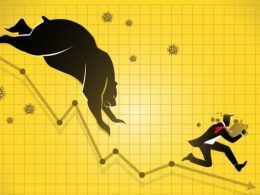by Kevin McCreadie, Chief Executive Officer and Chief Investment Officer, AGF Management Ltd.
Equity markets retreated in June after rallying aggressively off March lows the previous two months. AGF’s CEO and Chief Investment Officer discusses the reason for the pullback and why future gains will be hard to come by without clear catalysts on the horizon
The stock market rally off March lows has stalled in recent weeks. What’s keeping a lid on prices?
The longer the pandemic lasts, the more likely it is that investor sentiment wanes. That’s what we’ve seen the past few weeks as new cases of the virus surged across the United States and states like Texas pulled back on the restart of their economy. Think of what it does to people’s confidence when restaurants and bars are forced to close again and those who work there are also out of a job again. After such a long shutdown, it is demoralizing—even if we’re not directly involved—and so that’s what’s weighing on markets right now. On top of that, it doesn’t seem like there’s the same willingness to fight the virus through social distancing and other measures as there was early in the pandemic. Younger people, in particular, are becoming the focal point for the disease but given that it affects them less severely than the elderly, they may be more willing to suffer the consequences if it means not giving up their perceived freedoms. And maybe they’re justified to think that, but it’s still unnerving for markets not knowing exactly where this is headed. We believe the bar is very high to shut down states or provinces again, however, the fear of that will hang over markets if the virus continues to surge.
Are there any catalysts on the near horizon that can kickstart the rally?
There’s not much reason to expect stocks will rally aggressively again if the number of new cases continue to grow in the U.S. That doesn’t mean they won’t push higher from here over the next few months. In fact, that’s our base case for the second half of the year, but it’s going to be a grind with bouts of volatility until we’re clear of the pandemic. To that end, second quarter earnings season, which starts next week may not be much of a catalyst. In part, that’s because of how the quarter lines up against the economic shutdown. Remember, while the market started soaring at the end of March, it wasn’t until May that the U.S. economy started to open again. Of course, that’s probably baked into the market somewhat, but the likelihood of there being enough big earnings surprises to the upside to move markets significantly higher seems low—especially if guidance disappoints given the more recent set back in the re-start of the U.S. economy. It also doesn’t help that the U.S. Federal Reserve recently told the biggest U.S. banks to suspend share buybacks and cap dividend payments at their current level for the third quarter of this year. Although share prices in many of these banks were hit hard following the announcement, the Fed noted that it will only allow dividends to be paid based on a formula tied to a bank’s recent earnings, setting up the possibility of further fallout down the road.
What about additional monetary and fiscal stimulus. Is that not a tailwind that can offset these headwinds?
Markets would react positively to more stimulus, but short of the recent announcements we’ve heard about what’s in the pipeline, it’s unclear when new stimulus might be put to work. Governments around the world have spent a load of money in the past few months and it should not be a surprise if they decide to drag their feet on new measures. Look at Canada, for instance. Fitch recently downgraded the country’s sovereign credit rating to AA+ from AAA, saying the country’s debt-to-GDP ratio will grow to 115% this year from just over 88% in 2019. The downgrade may not mean much in the grand scheme as all governments face similar strains, but the federal government’s deficit forecast has been raised even further since then on the view that more needs to be done to support the economy. In the U.S., meanwhile, the Presidential election could play a huge role in how quickly the U.S government rolls out its next fiscal package. The Democrats have President Trump on the ropes and may be less incentivized to work with the Republicans on a plan that both can agree on. After all, a weak economy hinders the President ‘s chance of re-election more than it hinders candidate Biden’s chance of being elected. In other words, the incentive to stimulate the economy may not be as strong as it was at the beginning of the pandemic, or at least, it’s not so clear cut and both parties remains far apart on the size and make-up of the next package.
Kevin McCreadie is Chief Executive Officer and Chief Investment Officer at AGF Management Ltd. He is a regular contributor to AGF Perspectives.
Visit our new COVID-19 resource page dedicated to the latest insights to help navigate through these unprecedented times.
The commentaries contained herein are provided as a general source of information based on information available as of July 9, 2020 and should not be considered as investment advice or an offer or solicitations to buy and/or sell securities. Every effort has been made to ensure accuracy in these commentaries at the time of publication, however, accuracy cannot be guaranteed. Investors are expected to obtain professional investment advice.
The views expressed in this blog are those of the author and do not necessarily represent the opinions of AGF, its subsidiaries or any of its affiliated companies, funds or investment strategies.
AGF Investments is a group of wholly owned subsidiaries of AGF and includes AGF Investments Inc., AGF Investments America Inc., AGF Investments LLC, AGF Asset Management (Asia) Limited and AGF International Advisors Company Limited. The term AGF Investments m ay refer to one or more of the direct or indirect subsidiaries of AGF or to all of them jointly. This term is used for convenience and does not precisely describe any of the separate companies, each of which manages its own affairs.
™ The ‘AGF’ logo is a trademark of AGF Management Limited and used under licence.
About AGF Management Limited
Founded in 1957, AGF Management Limited (AGF) is an independent and globally diverse asset management firm. AGF brings a disciplined approach to delivering excellence in investment management through its fundamental, quantitative, alternative and high-net-worth businesses focused on providing an exceptional client experience. AGF’s suite of investment solutions extends globally to a wide range of clients, from financial advisors and individual investors to institutional investors including pension plans, corporate plans, sovereign wealth funds and endowments and foundations.
For further information, please visit AGF.com.
© 2020 AGF Management Limited. All rights reserved.
This post was first published at the AGF Perspectives Blog.














